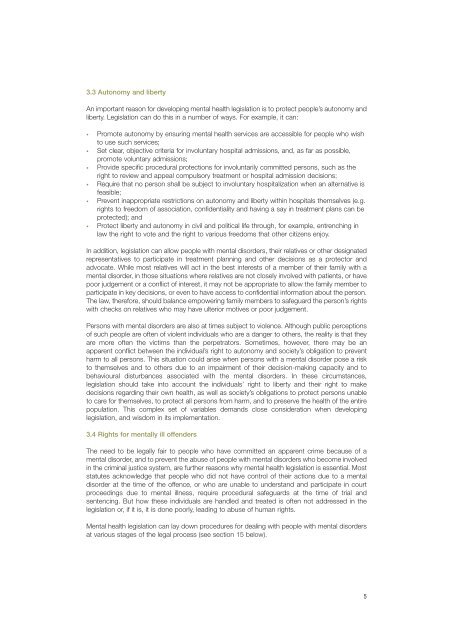human rights and legislation who resource book on mental health
human rights and legislation who resource book on mental health
human rights and legislation who resource book on mental health
You also want an ePaper? Increase the reach of your titles
YUMPU automatically turns print PDFs into web optimized ePapers that Google loves.
3.3 Aut<strong>on</strong>omy <str<strong>on</strong>g>and</str<strong>on</strong>g> liberty<br />
An important reas<strong>on</strong> for developing <strong>mental</strong> <strong>health</strong> <str<strong>on</strong>g>legislati<strong>on</strong></str<strong>on</strong>g> is to protect people’s aut<strong>on</strong>omy <str<strong>on</strong>g>and</str<strong>on</strong>g><br />
liberty. Legislati<strong>on</strong> can do this in a number of ways. For example, it can:<br />
· Promote aut<strong>on</strong>omy by ensuring <strong>mental</strong> <strong>health</strong> services are accessible for people <str<strong>on</strong>g>who</str<strong>on</strong>g> wish<br />
to use such services;<br />
· Set clear, objective criteria for involuntary hospital admissi<strong>on</strong>s, <str<strong>on</strong>g>and</str<strong>on</strong>g>, as far as possible,<br />
promote voluntary admissi<strong>on</strong>s;<br />
· Provide specific procedural protecti<strong>on</strong>s for involuntarily committed pers<strong>on</strong>s, such as the<br />
right to review <str<strong>on</strong>g>and</str<strong>on</strong>g> appeal compulsory treatment or hospital admissi<strong>on</strong> decisi<strong>on</strong>s;<br />
· Require that no pers<strong>on</strong> shall be subject to involuntary hospitalizati<strong>on</strong> when an alternative is<br />
feasible;<br />
· Prevent inappropriate restricti<strong>on</strong>s <strong>on</strong> aut<strong>on</strong>omy <str<strong>on</strong>g>and</str<strong>on</strong>g> liberty within hospitals themselves (e.g.<br />
<str<strong>on</strong>g>rights</str<strong>on</strong>g> to freedom of associati<strong>on</strong>, c<strong>on</strong>fidentiality <str<strong>on</strong>g>and</str<strong>on</strong>g> having a say in treatment plans can be<br />
protected); <str<strong>on</strong>g>and</str<strong>on</strong>g><br />
· Protect liberty <str<strong>on</strong>g>and</str<strong>on</strong>g> aut<strong>on</strong>omy in civil <str<strong>on</strong>g>and</str<strong>on</strong>g> political life through, for example, entrenching in<br />
law the right to vote <str<strong>on</strong>g>and</str<strong>on</strong>g> the right to various freedoms that other citizens enjoy.<br />
In additi<strong>on</strong>, <str<strong>on</strong>g>legislati<strong>on</strong></str<strong>on</strong>g> can allow people with <strong>mental</strong> disorders, their relatives or other designated<br />
representatives to participate in treatment planning <str<strong>on</strong>g>and</str<strong>on</strong>g> other decisi<strong>on</strong>s as a protector <str<strong>on</strong>g>and</str<strong>on</strong>g><br />
advocate. While most relatives will act in the best interests of a member of their family with a<br />
<strong>mental</strong> disorder, in those situati<strong>on</strong>s where relatives are not closely involved with patients, or have<br />
poor judgement or a c<strong>on</strong>flict of interest, it may not be appropriate to allow the family member to<br />
participate in key decisi<strong>on</strong>s, or even to have access to c<strong>on</strong>fidential informati<strong>on</strong> about the pers<strong>on</strong>.<br />
The law, therefore, should balance empowering family members to safeguard the pers<strong>on</strong>’s <str<strong>on</strong>g>rights</str<strong>on</strong>g><br />
with checks <strong>on</strong> relatives <str<strong>on</strong>g>who</str<strong>on</strong>g> may have ulterior motives or poor judgement.<br />
Pers<strong>on</strong>s with <strong>mental</strong> disorders are also at times subject to violence. Although public percepti<strong>on</strong>s<br />
of such people are often of violent individuals <str<strong>on</strong>g>who</str<strong>on</strong>g> are a danger to others, the reality is that they<br />
are more often the victims than the perpetrators. Sometimes, however, there may be an<br />
apparent c<strong>on</strong>flict between the individual’s right to aut<strong>on</strong>omy <str<strong>on</strong>g>and</str<strong>on</strong>g> society’s obligati<strong>on</strong> to prevent<br />
harm to all pers<strong>on</strong>s. This situati<strong>on</strong> could arise when pers<strong>on</strong>s with a <strong>mental</strong> disorder pose a risk<br />
to themselves <str<strong>on</strong>g>and</str<strong>on</strong>g> to others due to an impairment of their decisi<strong>on</strong>-making capacity <str<strong>on</strong>g>and</str<strong>on</strong>g> to<br />
behavioural disturbances associated with the <strong>mental</strong> disorders. In these circumstances,<br />
<str<strong>on</strong>g>legislati<strong>on</strong></str<strong>on</strong>g> should take into account the individuals’ right to liberty <str<strong>on</strong>g>and</str<strong>on</strong>g> their right to make<br />
decisi<strong>on</strong>s regarding their own <strong>health</strong>, as well as society’s obligati<strong>on</strong>s to protect pers<strong>on</strong>s unable<br />
to care for themselves, to protect all pers<strong>on</strong>s from harm, <str<strong>on</strong>g>and</str<strong>on</strong>g> to preserve the <strong>health</strong> of the entire<br />
populati<strong>on</strong>. This complex set of variables dem<str<strong>on</strong>g>and</str<strong>on</strong>g>s close c<strong>on</strong>siderati<strong>on</strong> when developing<br />
<str<strong>on</strong>g>legislati<strong>on</strong></str<strong>on</strong>g>, <str<strong>on</strong>g>and</str<strong>on</strong>g> wisdom in its implementati<strong>on</strong>.<br />
3.4 Rights for <strong>mental</strong>ly ill offenders<br />
The need to be legally fair to people <str<strong>on</strong>g>who</str<strong>on</strong>g> have committed an apparent crime because of a<br />
<strong>mental</strong> disorder, <str<strong>on</strong>g>and</str<strong>on</strong>g> to prevent the abuse of people with <strong>mental</strong> disorders <str<strong>on</strong>g>who</str<strong>on</strong>g> become involved<br />
in the criminal justice system, are further reas<strong>on</strong>s why <strong>mental</strong> <strong>health</strong> <str<strong>on</strong>g>legislati<strong>on</strong></str<strong>on</strong>g> is essential. Most<br />
statutes acknowledge that people <str<strong>on</strong>g>who</str<strong>on</strong>g> did not have c<strong>on</strong>trol of their acti<strong>on</strong>s due to a <strong>mental</strong><br />
disorder at the time of the offence, or <str<strong>on</strong>g>who</str<strong>on</strong>g> are unable to underst<str<strong>on</strong>g>and</str<strong>on</strong>g> <str<strong>on</strong>g>and</str<strong>on</strong>g> participate in court<br />
proceedings due to <strong>mental</strong> illness, require procedural safeguards at the time of trial <str<strong>on</strong>g>and</str<strong>on</strong>g><br />
sentencing. But how these individuals are h<str<strong>on</strong>g>and</str<strong>on</strong>g>led <str<strong>on</strong>g>and</str<strong>on</strong>g> treated is often not addressed in the<br />
<str<strong>on</strong>g>legislati<strong>on</strong></str<strong>on</strong>g> or, if it is, it is d<strong>on</strong>e poorly, leading to abuse of <str<strong>on</strong>g>human</str<strong>on</strong>g> <str<strong>on</strong>g>rights</str<strong>on</strong>g>.<br />
Mental <strong>health</strong> <str<strong>on</strong>g>legislati<strong>on</strong></str<strong>on</strong>g> can lay down procedures for dealing with people with <strong>mental</strong> disorders<br />
at various stages of the legal process (see secti<strong>on</strong> 15 below).<br />
5

















